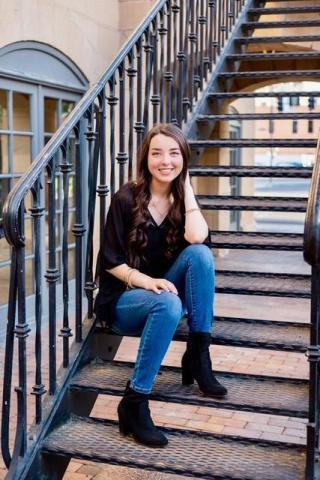WRL vignette II: Keep adapting and carry on
What Kaylee Welch learned about forward motion
Editors’ note: Kaylee’s story is one of two in this newsletter that explore undergraduate academic enrichment in English’s writing, rhetorics and literacies concentration during the coronavirus pandemic. You can read about Alyssa’s research here.
It started with a Barrett honors contract.
In early 2019, Kaylee Welch, a first-year ASU student at the time, approached English Professor Elenore Long about completing an honors contract in her ENG 205: Introduction to Writing, Rhetorics and Literacies class. And Long had just the idea.
As Welch recounted, “She was excited to have me be a part of a project that she was already working on with the English department and some interns from ASU Enterprise Hub: the production of a series of videos which would be used to inform current and prospective ASU students about the [writing, rhetorics and literacies] concentration.”
During Welch’s experience producing the videos, she and the project participants recognized that they had been “employing certain methodology that we recognized as integral to our process and felt that they would be helpful to share with others to some capacity.” The team was so successful in articulating their method and executing their vision that they were invited to present a workshop at the 2019 Association of Rhetoric and Writing Studies (ARWS) Conference. Workshop attendees included scholars, lecturers, and writers—in essence, people these undergraduates viewed as mentors and exemplars.
Welch emoted about her experience at the conference: “It was an amazing experience to connect with scholars like Dylan Dryer, Jennifer Clifton, and Cristóbal Martínez—all of whose work I was familiar with—and to hear about the current work that they were up to. Opportunities like that don’t come by every day, and I was so fortunate to have been a part of it!”
When she initially enrolled as an English major, Welch had selected a creative writing concentration: “I knew I wanted to pursue writing.” But at an orientation event right before her first year, she heard about writing, rhetorics and literacies (WRL). Her advisor suggested that the concentration might be something in which she’d be interested, since Welch had shared her desire to attend law school. Welch liked that she could develop both argumentative and writing skills in WRL, and that it was a small program where she could develop personal relationships with her professors. Looking back, Welch can see clearly how her current academic trajectory was launched: “As excited as I was about WRL, it wasn’t until I started my research with Professor Long that I actually realized my passion for rhetoric studies.”
Welch is at work on an honors thesis that synthesizes her research areas of interest—semiosis and cognitive rhetoric studies:
I developed interest for these areas after reading some of Linda Flowers’ work and being inspired by the work of Stephen Witte and by theories of my literacy professor, Peter Goggin. My interest in semiotic movement and rhetorical decision making also led me to begin to research and find interest in accessible design studies, where I have been especially inspired by principles of universal design, which theorizes different “ways to move” in a learning environment for diverse audiences with different ability ranges. Dr. Elenore Long has mentored me and encouraged me to explore each of these areas of interest and had a major part in introducing me to them.
Welch and Long will continue their work together in the Fall 2020 semester via an internship. “I’m very excited about the work that we’re up to!” Welch said. She expresses her gratitude for the partnership she shares with Long—and said it has been a motivating force during the pandemic. “[Long] has continued to be so supportive, and I am very lucky to be working with her to the extent that I can even during the pandemic. I am so thankful for her patience and willingness to continue working with me even with all of the uncertainty, and I am excited for what is to come!”
Welch is currently in full-time LSAT prep and will be applying to law schools this fall. “I am very excited to continue my research in rhetoric while also pursuing a JD,” she said. As for her goals: “I plan to continue cultivating my passion for rhetoric research and I am hopeful that I will be able to share it with others beyond my honors thesis. I also hope to extend my research into exploring dialogue across different worldviews, which has always been an interest of mine.”
Through all of the uncertainty of the COVID era, Welch reflected on what she’s discovered about her own resilience and how she learned the relatable lesson of “carrying on”:
The pandemic time has taught me how to adapt; I think it would have been easy for me to feel like my life—my research, responsibilities, goals, plans—was on pause during this time, but in retrospect, I recognize how valuable it was for me to decide to learn how to carry on and keep moving instead of waiting around for a change. Facing these challenges has contributed to my personal and scholastic growth, and my work has been able to keep me grounded.
Welch’s ability to keep moving teaches the importance of personal work, yes—but also how important collaboration is to students’ professional, scholastic, and personal lives. With one professional conference already under her belt, there’s no doubt that Welch will continue to navigate this time of uncertainty and achieve her educational goals, one step at a time.
—Meghan Apao
Image 1: Courtesy photo of Kaylee Welch
Video: The first in the "Discover Writing, Rhetorics and Literacies" video series that Welch co-produced.
Image 2: Welch learned to adapt—and take things "one step at a time"—as she continued her research throughout the pandemic. Courtesy photo.


